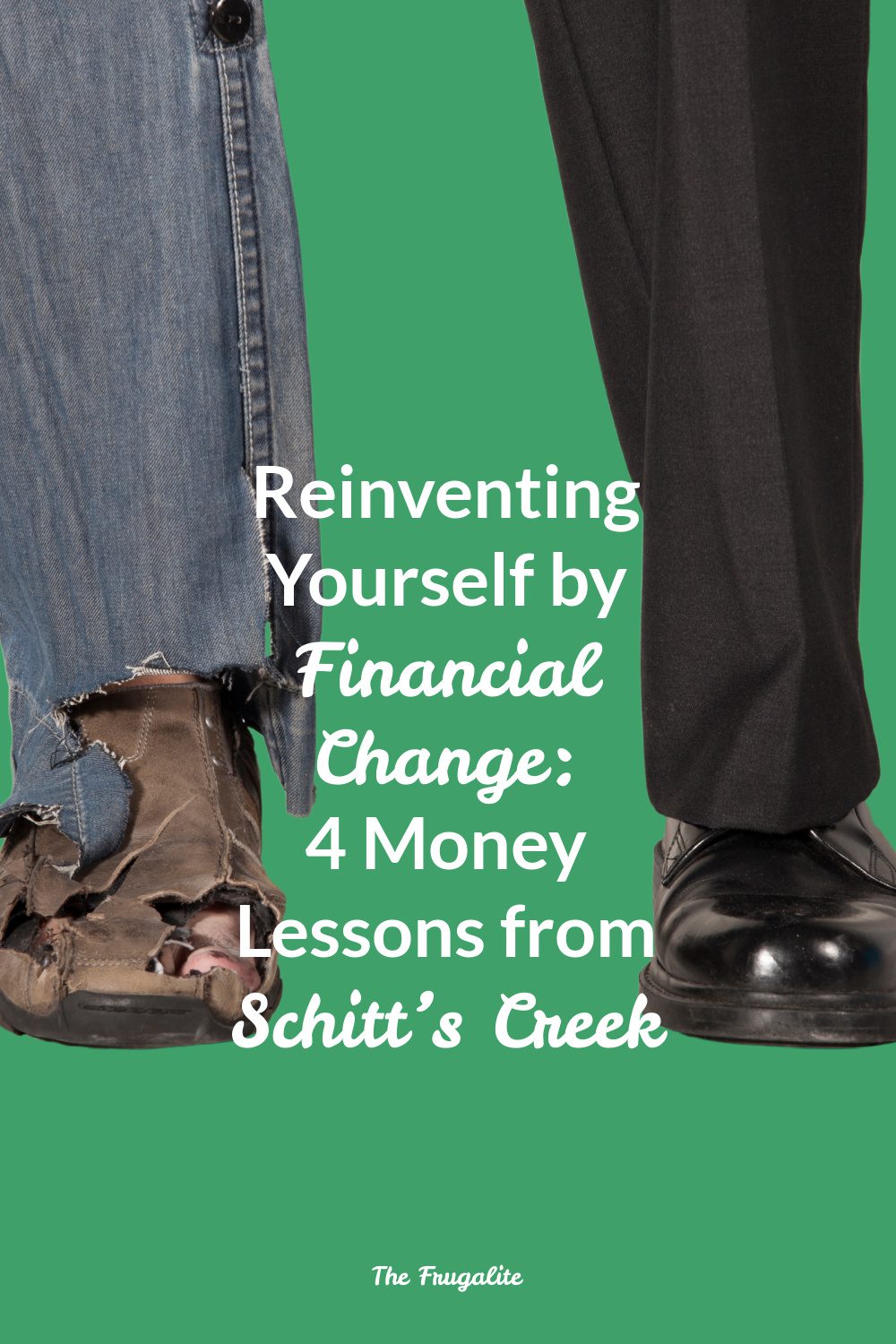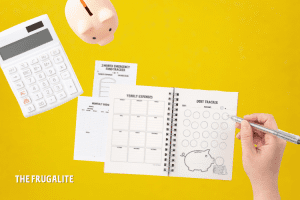(Psst: The FTC wants me to remind you that this website contains affiliate links. That means if you make a purchase from a link you click on, I might receive a small commission. This does not increase the price you’ll pay for that item nor does it decrease the awesomeness of the item. ~ Daisy)
By the writer behind DigitalNomadLife.org
For those who missed out on the Emmy-winning series Schitt’s Creek, you also missed plenty of worthwhile financial lessons. A sitcom about a riches-to-rags family may not at first seem like a vessel of knowledge. Through their tribulations, however, the Rose family learned that simply having money isn’t enough. Smart financial decisions and down-to-earth living will pay dividends beyond monthly checks.
Best of all, one doesn’t need to have lost everything to learn these lessons. Whether you are just setting up your budget or ready to make changes to achieve financial independence, there are several lessons for everyone.
Schitt’s Creek is full of golden nuggets of information, from credit lessons to reading the fine print. For those ready to reinvent themselves through financial change, here are four money lessons to help get you on the right track.
1. Make a budget and stick to it.
Like many of us, the Rose family didn’t keep a budget. Though they were wealthy from their video store empire, their lack of financial attention ruined them. By not following their finances, they didn’t see their financial manager embezzling their fortune away. Suddenly, they had nothing—all because they didn’t watch their finances.
Most of us won’t have such a dramatic financial story. However, this is a perfect example of the importance of a budget, and routinely checking in on your budget.
No matter your financial situation, you need to develop a budget that works with you, your lifestyle, and your financial goals. Everyone needs money to live, but how much of your money goes to less-than-important items?
To start, add up all of your necessary monthly expenses. This includes rent or mortgage payments, car payments, and utilities. Be sure to factor in any additional payments, such as credit cards and essential subscription services. Once you’ve added up your necessary expenses, compare that to your monthly income. How much do you have left over? Is it enough to pay off your debts, or can you tighten up other areas of your finances for more savings potential?
Your budget should include three major categories:
- Fixed expenses, such as utilities and car payments.
- Variable expenses, including groceries and important entertainment.
- Luxury expenses, which can range from spending money to food-delivery services.
Your fixed and variable expenses are the essentials that you need to live (with enough fun and comfort to be happy). Luxury expenses should be the first category to be trimmed down while you refocus. A little sacrifice now will pay dividends later. You must audit your budget routinely, especially after major financial or lifestyle changes.
Even if you don’t have debts, you should consider the future. Diverting extra funds to investment and retirement accounts can make a big difference later. And the earlier you start, the more you can save. Make sure the budget works for you, but don’t make it too restrictive. There are several budget models for anyone to follow.
2. Spend within your means. Save beyond your plans.
Often, readjusting to a more frugal lifestyle will come as a bit of a shock. Like the Roses, it can cause distress when you cannot spend money as you once did. It will take some time to get used to tighter finances. You will get used to it, though, especially once you see your debts falling and your savings accounts growing.
Spending within your means is essential to achieve financial stability. With a budget, this can be made easier. Knowing how much money you can “play around with” each month allows you to balance the things you want with the things you need (including savings).
In today’s hyper-marketable age, the temptation to spend comes from nearly every direction. Advertisements run on every device we have, subconsciously (or blatantly) compelling us to spend money. Luckily, there are ways to fight these mind games and save that money for yourself. Most of these techniques require minimal effort on your part. For example:
- Unsubscribe from retailer mailing lists. If you aren’t looking at daily deals and weekly price drops, you’ll be less compelled to spend.
- Delete your saved card information across your devices. Yes, it is convenient to spend without copying your card information every time. But that also makes it easier to spend.
- Focus on your hydration. You read that right. Switch out coffee, soda, and alcohol for tap water. Buy a filter, and save money. Plus, staying hydrated keeps your mind sharp and stress down. It’s a win-win.
- Shop at locations with free points services. Look for stores and other services with point-earning memberships. Make sure the memberships are free, and you’ll be earning “money” just from your necessary shopping.
Active financial decisions such as these will take some getting used to, but by doing so, you will take control of your finances. Making your money work for you is the key to financial independence and debt-free living. Don’t let flashy marketing attempts pry the cash from your hands. Keep those funds and save them away for your future.
3. Keep your credit strong.
After the Rose family’s financial fall, one of the sons was thrilled to be able to buy his special Parisian eye cream. Having no actual money, he simply used one of his credit cards that still worked. You might understand why this is a problem.
Credit isn’t free money. Anything you spend on a credit card still has to be paid, and if you don’t do so immediately, you’ll end up paying more for your items due to interest rates. Good credit is essential for important life goals, such as securing a mortgage loan or starting a business. Still, these goals will take time to realize. Smart credit usage begins with smart choices, such as:
- Never use a card for funds you don’t have.
- Never use a card with a high interest rate (always search for the lowest interest you can find).
- Always immediately pay off your purchases to avoid added interest.
- Always treat your credit cards like a tool, not your primary spending line.
Building your credit is important. However, failing to do so correctly can lead to spiraling debt, missed payments, and a poor credit score that can be difficult to recover from. If you ever have doubts that you’ll be able to handle a card responsibly, follow your instincts and stay away until your finances are in better shape.
You can also consider a secured credit card. These report to the credit bureaus and help build your credit like a standard credit card. The initial credit line, though, is set by an initial secured deposit. So, if you open a secured credit card with a $500 deposit, your credit line will be $500. Secured cards can be a great way to use and build your credit without an oversized limit that can lead to problems.
Many secured cards will upgrade to standard cards after a period of financial growth and stability. This will make it easier for you to achieve prime loan rates and other offers without jeopardizing your finances.
4. Get things in writing and read the fine print.
The Rose family’s inattention to important details led to their financial ruin. Always read the fine print if you don’t want to find yourself up Schitt’s Creek.
You must understand everything that needs your signature. From credit card agreements to medical directives, the fine print is essential. It may be dry reading, but by understanding the critical, possibly detrimental details, you can save yourself the shock of an increasing interest rate or other similar “fine print” clauses.
In some situations, like child support or other court-appointed mandates, not reading the fine print can lead to many problems. Fines may be the least of your worries when there is a bench warrant issued for your arrest. Though such instances are drastic, they are not uncommon. Get into the habit of reading everything that you sign up for.
Have copies of all agreements in writing. Request a job offer in writing before accepting it. This will ensure your employer doesn’t switch your salary once you start. This tactic is known to be used by less-than-savory business owners.
Always request copies of any contracts you sign, such as utilities. Understand the why and how of your finances. It may be tedious, but you can’t take control over your life and finances if you aren’t clear on the fine print.
Final thoughts on financial lessons from Schitt’s Creek
Finances can be daunting. There is a mountain of responsibility and information behind every financial decision. That’s why it’s so important to take control of those decisions. Make your money work for you. Don’t let frivolous subscriptions and unnecessary spending bleed your hard-earned cash away. Spend within your means, and save for your future.
Credit can be an important tool to help you, but you should never rely on it. Use it to advance your finances, but never become beholden to a credit card. Finally, get used to reading the fine print. The legalese is always dry and confusing, but before you sign your name to anything, you must understand a contract front to back. This is your life and future at stake. Don’t let your plans fail because of an unread clause.
What about YOU?
Do you have any shows that you’ve been surprised to have learned lessons from? Let us know in the comments.
About Molly Barnes
Molly is a full-time digital nomad, traveling the US with her boyfriend in their RV as she writes about her experiences. She can be found over at digitalnomadlife.org.















1 thought on “Reinventing Yourself by Financial Change: 4 Money Lessons from Schitt’s Creek ”
I would also add not storing payment information greatly decreases any potential financial impact from a breach. Store as little information as you can IF you are required to create an account. You may have to go out and remove the payment info after each order. Yes, somewhat a pain but necessary in my book.